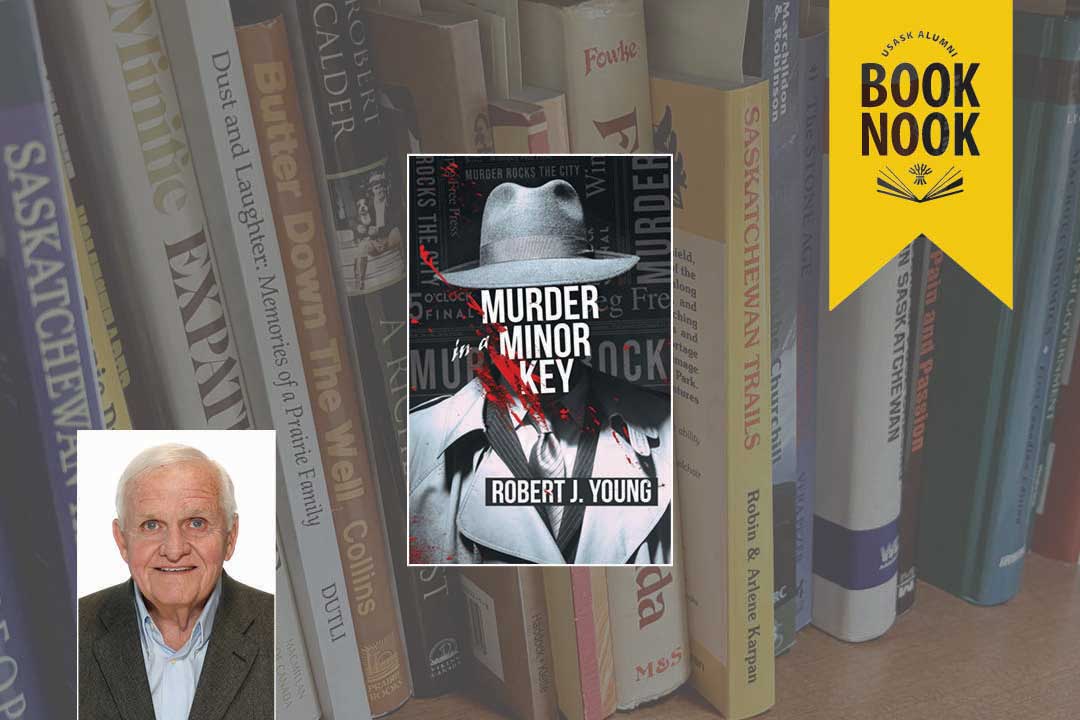
Alumni Book Nook: Dr. Robert J. Young (BA’63, MA’65, PhD)
Award-winning USask history graduate Dr. Robert J. Young, a professor emeritus at the University of Winnipeg, has written a new historical fiction novel
University of Saskatchewan (USask) graduate Dr. Robert J. Young (BA’63, MA’65, PhD), a leading Canadian expert on 20th-century European history, is trying his hand at writing historical fiction.
His latest novel, Murder in a Minor Key, published by At Bay Press, focuses on solving the murders of two music adjudicators in Winnipeg in the 1930s. The book, which follows Young’s 2018 novel, Another Spy for Paris, centres on a blind chief inspector from the Winnipeg police force.
Born in Moose Jaw, Sask., Young completed two degrees at USask, earning a Bachelor of Arts (honours) degree in 1963, followed by a Master of Arts degree in history in 1965. He then earned a PhD at the London School of Economics in 1969 before embarking on a 40-year career as a faculty member at the University of Winnipeg, where he is now a professor emeritus.
Young, who lives in Winnipeg, Man., is the author of nine academic books and three novels. His 1991 monograph, Power and Pleasure: Louis Barthou and the Third French Republic, won the Wallace K. Ferguson Prize from the Canadian Historical Association for the best book in non-Canadian history. He has also received major awards for research and teaching from the University of Winnipeg and earned national recognition with the 1996 Canadian Professor of the Year Award from the Canadian Council for the Advancement of Education. In 2023, he received the College and University Retiree Associations of Canada Tribute Award. This spring, he was named a recipient of a 2025 College of Arts and Science Alumni of Influence Award.
The Green&White recently asked Young about his latest book, Murder in a Minor Key.
What response have you received from readers to your new historical fiction novel?
I’ve seen no formal reviews. The responses from, of course, discerning friends have been quite enthusiastic. The cover contains the following: “A delightful romp through inter-war Winnipeg, featuring two grisly but intriguing murders.” That from Carol Dahlstrom, a very successful Manitoba novelist.
What are five adjectives that you would use to describe your book?
Thought-provoking, atmospheric, amusing, touching, and inspirational.
What do you enjoy about writing historical fiction?
I suppose it is the power of imagination that most attracts—the freedom to create a story within the broad boundaries of evidence. For academic historians, those opportunities are both exhilarating, and terrifying! How far can I go, and keep the fiction true?
Did your education at USask play a role in researching and/or writing this book?
Absolutely! Thanks to the honours history program, and then my master’s thesis addressed to France and the Rhineland Crisis of 1936, following which came the Sanderson Scholarship and three years at the London School of Economics.
How did studying history at USask prepare you for a writing career?
I was privileged to have as agreeable and demanding guides Dr. Hilda Neatby, Dr. Roger Graham, Dr. Michael Fry, Dr. Ivo Lambi, and Dr. Kathryn Young, all of them fine teachers and all published historians.
Why would you recommend your book to USask alumni?
Though based on intensive research, this book is free of footnotes, endnotes, bibliographical convention, and unruly paragraphs. And it is centred on Winnipeg of the 1930s.
What advice do you have for other USask alumni who may want to follow in your footsteps and write a novel?
I would say “try it.” What’s the worst that can happen within the confines of your writing room? And should something emerge after months/years of scribbling in the dark, prepare yourselves to be tested by assessors who, too often, cannot agree among themselves. You may be able to proceed on the positive front but may be forced to rethink less enthusiastic evaluations. On the vast scales of humanity, being asked to reframe or rewrite some text is perfectly endurable. And common!
What are your plans now that Murder in a Minor Key has been released?
I have a contract for another murder mystery, set in Winnipeg of the 1930s, and featuring the blind detective Sidney Baxter, his francophone lieutenant Maxime Godbout, and the resolute reporter for the Winnipeg Free Press Winnifred Thompson. It is entitled Remembrance Day Murders.


